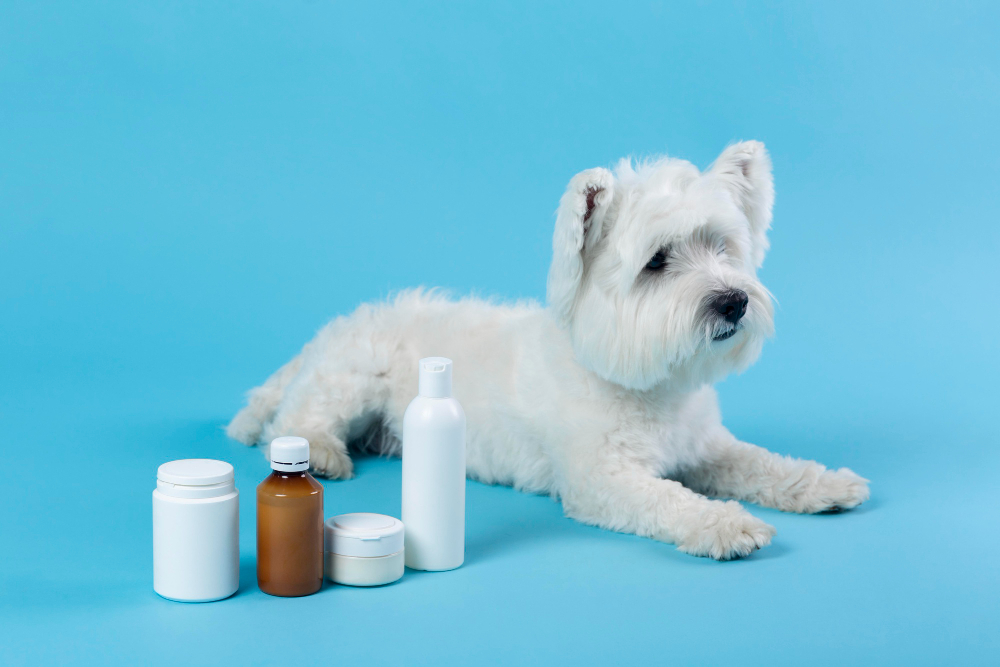A dog’s skin is a window into their overall health. It reflects their diet, living environment, and internal well-being.
Yet, just like us, some dogs suffer from skin conditions that aren’t easily remedied with a change in food or shampoo. This is where skin supplements come into play.
Comprehending the nuances of skin supplements for dogs can be pivotal in ensuring your furry companion leads a comfortable life. So let’s take a look at different types of skin supplements for dogs below:
Omega-3 Fatty Acids: The Skincare Superfood
Omega-3 fatty acids have become a household name in terms of human health, particularly for supporting brain and heart health. However, the benefits of Omega-3 extend to our pets as well. They play a crucial role in improving skin and coat health.
Omega-3s are a type of essential fatty acid that is not produced by the body. This means that they must be obtained from the diet. They are the building blocks of healthy cell membranes, which act as barriers to harmful substances.
Omega-3 for pets can alleviate dry, flaky skin, and reduce itching. It can lead to a shinier coat.
Various fish oils are rich in Omega-3s. For example, salmon oil for dogs is a popular choice as it contains high levels of EPA and DHA, two types of Omega-3s that offer numerous health benefits.
Probiotics: The Internal Balancers
Probiotics are microorganisms that provide health benefits when consumed. For dogs, they are instrumental in maintaining a healthy balance of gut bacteria. This has a direct impact on their skin health and overall immune function.
Probiotics help in digestion and nutrient absorption. This can influence the skin and coat health of a dog.
A healthy gut translates to a stronger immune system that can better fight off allergens and infections. These are common culprits of skin issues.
Probiotics can be found in various forms, including powders, capsules, and special dog treats. Look for products that contain a variety of beneficial strains and that specify the number of live cultures.
Zinc: The Healing Touch
Zinc is a mineral that is important for proper growth and maintaining a healthy immune system. When it comes to skincare, it’s an essential nutrient that helps heal and protect canine skin health.
Zinc is involved in numerous body processes, including wound healing, synthesis of DNA, and protein production. Dogs with zinc deficiencies can develop skin problems, including lesions, crusted skin, and a dull coat.
Good sources of zinc in dog supplements include zinc methionine and zinc proteinate. These are forms more easily absorbed by the body. Foods such as pumpkin seeds, whole grains, and dark meat can also provide this mineral in natural form for natural skin support.
Vitamin E: The Antioxidant Ally
Vitamin E is a potent antioxidant that helps protect the body’s cells from damage. It has a multitude of benefits, one being support for skin health.
Vitamin E supports the immune system, which is closely linked to skin health. Antioxidants work to neutralize free radicals, which can damage the skin and coat. For dogs, vitamin E can aid in reducing inflammation and promoting the healing of irritated skin.
High-quality dog foods often contain sufficient levels of vitamin E, but for dogs with specific skin issues or those who struggle with dry skin, a supplement might be beneficial. Natural sources of vitamin E in dog supplements include d-alpha-tocopherol acetate, a form that is most bioavailable for dogs.
Biotin: The Hair and Nail Strengthener
Biotin, a B vitamin, is critical for a dog’s healthy skin, coat, and nails. Known as the ‘H’ vitamin, biotin is frequently cited for its role in promoting hair health.
Biotin plays a crucial role in the synthesis of fatty acids. These are necessary for healthy skin and coat. Biotin deficiencies can lead to dermatitis, hair loss, and brittle nails in dogs.
Dog foods with high-quality ingredients, including organ meats and eggs, can provide sufficient amounts of biotin. However, supplementing with biotin dog vitamins can be beneficial for dogs with skin and coat issues.
Silica: The Support for Structure
Silica is a lesser-known mineral that is vital for the formation of collagen. It is a supportive protein for the skin. It is great for maintaining the integrity of the connective tissues within the body.
Silica is involved in the production of glycosaminoglycans (GAGs). These are the building blocks of healthy skin and connective tissues. In dogs, it can help improve the texture and appearance of the coat, as well as support the healing of wounds.
Silica can be found in a few foods, including oats, whole grains, and some vegetables. However, supplements specifically formulated for skin and coat health can provide doses appropriate for your dog’s needs.
Safflower Oil: The Linoleic Lift
Safflower oil is a vegetable oil that’s rich in linoleic acid. This is an omega-6 fatty acid that supports the structure and function of the skin.
Linoleic acid is a precursor to ceramides, which are fatty molecules that help form the skin’s barrier and retain moisture. For dogs, supplements containing safflower oil can help improve the skin’s texture and promote a soft, shiny coat.
High-linoleic safflower oil is the best source of this omega-6 fatty acid for dogs. It can be found in liquid supplements or as an ingredient in high-quality dog foods.
Multivitamins: The Complete Skin Health Package
Individual supplements can be beneficial for specific skin issues. However, a good multivitamin can act as a great solution. It ensures that your canine’s skin health is looked after.
A high-quality multivitamin will contain a combination of many of the supplements we’ve discussed. This approach offers a holistic solution to maintaining your dog’s skin health.
When choosing a multivitamin for your dog, look for one that is formulated for skin health. It should be easily digested and absorbed.
The vitamins and minerals should be in forms that are bioavailable. And you should feed them in appropriate amounts for dogs.
Skin Supplements for Dogs Are a Helping Hand
Skin supplements for dogs are designed to complement an already healthy diet. They can help address specific skin concerns or provide overall support for your dog’s skin health.
However, it’s important to note that not all dogs will benefit from the same supplements. Always consult with your veterinarian before adding any new supplement to your dog’s diet. They can guide you on which supplements may be suitable for your dog and in what doses.
Did you find this article helpful? If so, check out the rest of our site for more.





